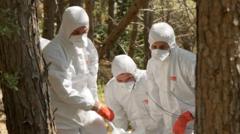Following a series of violent retaliatory attacks in Syria, the White Helmets have committed to aiding all victims, disregarding political and sectarian affiliations. The humanitarian group's leader emphasized their neutral approach, highlighting their response efforts during a period of heightened violence.
White Helmets Stand Firm Amidst Surge of Violence in Syria

White Helmets Stand Firm Amidst Surge of Violence in Syria
As militant attacks escalate, the White Helmets continue their mission to rescue all civilians, transcending political divides in a war-stricken country.
In recent days, Syria’s coastal region has witnessed a horrifying escalation of violence, including mass killings allegedly in retaliation for assaults on government forces. Amidst this turmoil, the volunteer rescue organization, the White Helmets, has been striving to provide help to those in need, maintaining their reputation as a humanitarian group.
Operating predominantly in areas previously held by rebels during the civil conflict, the White Helmets have recently extended their service into regions surrounding the capital, Damascus, where they have been celebrated as heroes. However, current realities have presented them with their most significant challenges yet. Reports suggest that most casualties from the recent attacks were civilians belonging to the Alawite sect, which is closely associated with the deposed government of Bashar al-Assad.
Abdulkafi Kayal, head of operations for the White Helmets in the affected coastal regions, stated, "When we go to rescue someone in need, we don’t ask them about their religion or political opinion." This perspective encapsulates the organization’s commitment to impartiality as they coordinate around 30 rescue missions daily, addressing incidents of extreme violence and retrieving bodies of the deceased.
These confrontations have led to accusations against Syrian security forces for revenge killings against Alawites amidst the growing tensions following Assad’s fall. Notably, over 1,400 civilians have been reported killed in the provinces of Latakia, Tartous, Hama, and Homs, highlighting the increasing chaos.
Despite condemnation from within the international community and ongoing conflict, the White Helmets remain committed to their ethos of service to all Syrians, stating, "Our slogan is 'To Save one life is to save all of humanity'." In a recent field operation, they recovered bodies in the village of Barmada, with signs suggesting brutal treatment of the victims. Eyewitness accounts and allegations from various locals point to a growing sense of fear and mistrust among citizens toward the newly emerged power structures.
Saber, a state security officer, voiced the struggles of rebuilding amid traumas of the past, establishing a complex landscape where loyalty and possibility for peace seem precarious. Meanwhile, families mourn lost loved ones, as illustrated poignantly in the story of Maen, whose son and aunt fell victim to recent violence.
Transitional president Ahmed al-Sharaa has announced the establishment of an independent committee to investigate the killings, underscoring the urgent necessity for accountability if peace and unity are to be fostered in this deeply fractured nation.
The continued operations of the White Helmets amidst these escalating tensions illustrate not only their resilience but also the pressing need for humanitarian aid and protection across all sects as Syria strives for a new, cohesive identity.
Operating predominantly in areas previously held by rebels during the civil conflict, the White Helmets have recently extended their service into regions surrounding the capital, Damascus, where they have been celebrated as heroes. However, current realities have presented them with their most significant challenges yet. Reports suggest that most casualties from the recent attacks were civilians belonging to the Alawite sect, which is closely associated with the deposed government of Bashar al-Assad.
Abdulkafi Kayal, head of operations for the White Helmets in the affected coastal regions, stated, "When we go to rescue someone in need, we don’t ask them about their religion or political opinion." This perspective encapsulates the organization’s commitment to impartiality as they coordinate around 30 rescue missions daily, addressing incidents of extreme violence and retrieving bodies of the deceased.
These confrontations have led to accusations against Syrian security forces for revenge killings against Alawites amidst the growing tensions following Assad’s fall. Notably, over 1,400 civilians have been reported killed in the provinces of Latakia, Tartous, Hama, and Homs, highlighting the increasing chaos.
Despite condemnation from within the international community and ongoing conflict, the White Helmets remain committed to their ethos of service to all Syrians, stating, "Our slogan is 'To Save one life is to save all of humanity'." In a recent field operation, they recovered bodies in the village of Barmada, with signs suggesting brutal treatment of the victims. Eyewitness accounts and allegations from various locals point to a growing sense of fear and mistrust among citizens toward the newly emerged power structures.
Saber, a state security officer, voiced the struggles of rebuilding amid traumas of the past, establishing a complex landscape where loyalty and possibility for peace seem precarious. Meanwhile, families mourn lost loved ones, as illustrated poignantly in the story of Maen, whose son and aunt fell victim to recent violence.
Transitional president Ahmed al-Sharaa has announced the establishment of an independent committee to investigate the killings, underscoring the urgent necessity for accountability if peace and unity are to be fostered in this deeply fractured nation.
The continued operations of the White Helmets amidst these escalating tensions illustrate not only their resilience but also the pressing need for humanitarian aid and protection across all sects as Syria strives for a new, cohesive identity.




















